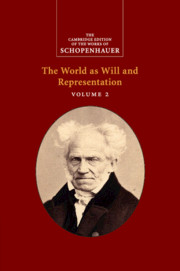Chapter 46 - On the Nothingness and Suffering of Life
Published online by Cambridge University Press: 30 June 2022
Summary
Awoken to life from the night of unconsciousness, the will finds itself as an individual in a world without end or limit, among countless individuals who are all striving, suffering, going astray; and it hurries back to the old unconsciousness, as if through a bad dream. – But until then its desires are unlimited, its claims inexhaustible, and every satisfied desire gives birth to a new one. No possible worldly satisfaction could be enough to quiet its longing, give its desires a final goal, and fill the bottomless pit of its heart. Moreover, we can see what usually becomes of a human being with any sort of satisfaction: it is for the most part nothing more than the meagre daily preservation of this existence itself, amid endless trouble and constant care, in the struggle with need and with death in view. – Everything in life proclaims that earthly happiness is ordained to be in vain or recognized as an illusion. The basis for this lies deep in the essence of things. Accordingly, life for most human beings turns out to be miserable and short. For the most part, the comparatively happy only appear so, or else, like the longlived, they are rare exceptions for whomthe possibility had to remain open – as a decoy. Life presents itself as an ongoing deception, in matters both small and large. What is promised is not delivered, unless it is to show how undesirable the thing desired was: and so we are deceived now by the hope and now by what we had hoped for.What is given is given only so that it can be taken away. The magic of distance shows us paradises that vanish like optical illusions after we have allowed ourselves to be taken in. And so happiness always lies in the future, or in the past, and the present is like a 658 small dark cloud driven by the wind over the sunlit plains: both in front of it and behind it everything is bright, it alone casts a constant shadow. The present is therefore always unsatisfying, but the future is uncertain, and the past cannot be recovered.
- Type
- Chapter
- Information
- Schopenhauer: The World as Will and Representation , pp. 588 - 603Publisher: Cambridge University PressPrint publication year: 2018



